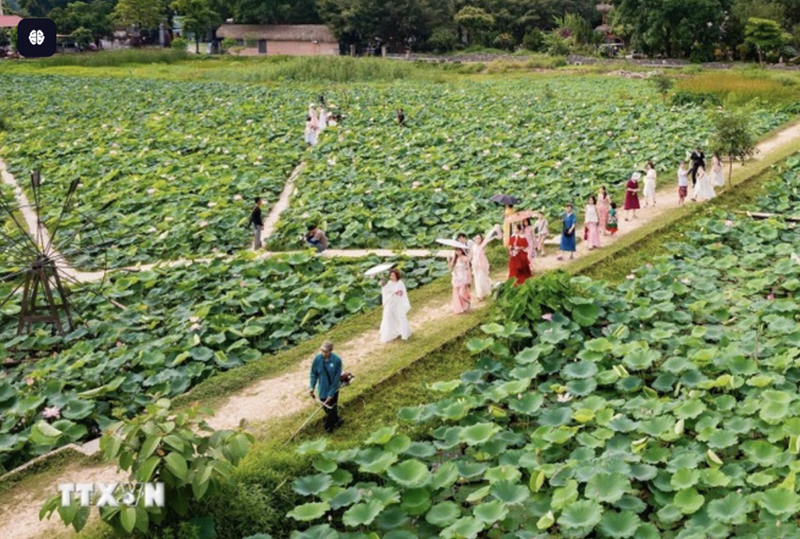Innovative and sustainable models
At Cuc Phuong Ginseng Cooperative, soil is thoroughly ploughed and enriched with microbially fermented organic fertilizer. Weeding is done manually, irrigation water comes from upstream sources, and plants are nurtured with a combination of worm compost extract, fish amino acids, microbial supplements and molasses. Pests are controlled using biological agents made from garlic and chilli.
    |
 |
|
Lotus flower season in Ninh Binh province |
Thanks to these organic cultivation methods, most ginseng roots are large, clean, and nutrient-rich, processed into various products such as ginseng powder, tea, wine, and functional foods. The cooperative earns between 150–200 million VND (6,000-8,000 USD) per hectare, while creating stable jobs for local workers.
Covering nearly five hectares, the cooperative is cultivating ginseng to Good Agricultural and Collection Practices (GACP) standards – recognized by the World Health Organization (WHO) - and is gradually upgrading its machinery and technology to enhance product quality for international markets.
According to Nguyen Duc Tuan, Senior Adviser at the Cuc Phuong Ginseng Cooperative, the cooperative was established in 2022 and obtained organic certification in 2023. Growing organically has created an ecological balance for both flora and fauna, while improving product quality and value, he said.
Located in the buffer zone of the Trang An World Heritage Site, RiTi Cooperative integrates conservation, production and community development. It cultivates medicinal herbs such as chrysanthemums and dandelions on nearly two hectares using circular organic methods, certified in 2022.
The cooperative has built a meter vermicompost facility to ensure a stable, high-quality fertilizer supply, planted hedges and intercropped species to attract beneficial insects, and eliminated synthetic chemicals. These sustainable practices have turned the flower gardens into thriving habitats for bees and ladybirds, yielding profits of 13–14 million VND per sao (360 square meters).
The RiTi Cooperative is reviving the mountain chrysanthemum as a unique cultural and herbal product of Vietnam. It also promotes local livelihoods through agritourism, offering farm visits, tea tasting, and heritage storytelling.
According to Hoang Minh Thanh, Chairman of the RiTi Cooperative, transitioning to organic farming not only helps protect natural resources and promote a sustainable green economy, but also, when combined with tourism, enhances product value and raises public awareness of environmental protection.
Enhancing agricultural value
Implementing the Government’s Project 885 on developing organic agriculture for the 2020–2030 period, Ninh Binh has introduced comprehensive policies to support speciality rice and organic vegetables, promote high-tech and mechanized production, encourage land accumulation, and foster cooperatives and value chain linkages under the “four stakeholders” model – farmers, enterprises, scientists, and the State.
By late 2024, Ninh Binh had expanded organic and low-emission farming across thousands of hectares, with internationally certified aquaculture products positioning the province for export and global integration.
Multi-value agricultural models such as the “Golden Rice Fields of Tam Coc”, “Hang Mua Lotus Pond”, and “Cuc Phuong Yellow Camellia Tea Gardens” have combined organic production with tourism, helping Ninh Binh attract an estimated 31.7 million visitors and generate 31.1 trillion VND (1.22 billion USD) in revenue in the 2020-2025 period.
According to Nguyen Sinh Tien, Deputy Director of the provincial Department of Agriculture and Environment, Ninh Binh’s cultural heritage, natural beauty, and leading agricultural sectors have provided a strong base for tourism and rural economic growth.
According to Tran Anh Dung, Vice Chairman of the Ninh Binh provincial People’s Committee, the province views green and organic agriculture as a key driver of sustainable growth. Ninh Binh plans to expand organic production zones, promote agritourism, and support farmers in transitioning to organic methods.
It will also help businesses build brands, adopt advanced technologies and digital tools, and strengthen international cooperation to enhance production and management capacity.
Source: VNA